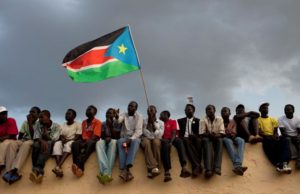Migration policy puts South Sudan on path to reconciliation and rebuilding
 South Sudan, the world’s newest nation state, is working to finalise a migration policy that it hopes will enhance the country’s capacity to manage its borders while also protecting the rights of migrants and helping to entrench a peace accord that has seen the end of a five year civil war.
South Sudan, the world’s newest nation state, is working to finalise a migration policy that it hopes will enhance the country’s capacity to manage its borders while also protecting the rights of migrants and helping to entrench a peace accord that has seen the end of a five year civil war.
The South Sudan government has been collaborating with the International Organization for Migration (IOM) to develop the country’s first ever such policy with funding from Japan, the EU and Germany.
In 2017, South Sudan was hosting around 45,000 migrants, the majority were from East Africa and Horn of Africa, according to United Nations data.
South Sudan is a country of destination for many migrants, but it also is a transit country for people on the route to North Africa and ultimately Europe.
Migrants’ movements in South Sudan are mixed – both in terms of root causes and duration – and include refugees, migrant workers with or without families, as well as unaccompanied migrant children and victims of trafficking.
A number of those migrants travelling to, or through, the country enlist the services of smugglers to facilitate their journeys.
A recent ceasefire saw the end of five years of devastating civil war which has left an estimated 400,000 people dead and more than four million displaced.
South Sudan was born less than 10 years ago after a decade-long conflict and secession battle with Sudan ended in 2011.
But since gaining its independence, it has barely seen two full years of peace.
The country has been ravaged by conflict since political tensions between President Salva Kiir and Vice President Riek Machar flared into full-scale civil war in 2013 – just two years after independence from Sudan.
Despite the recent shaky ceasefire, the economy and infrastructure remain in a parlous state.
Half of the almost 13 million population need humanitarian assistance and 4.5 million people are displaced, either within the country or abroad.
A draft of the new migration policy was released recently.
The IOM says the process of developing a comprehensive migration policy began in October 2018 with a consultative workshop where key stake-holders led by the Government set priorities to be addressed by the policy.
In the months that followed, consultants with global expertise in developing migration policies set about working on the draft
South Sudan Deputy Interior Minister Brigadier General Riaw Chuol said the migration policy was a first step in rebuilding the nation.
“The Government is committed to adopting this policy as it guides South Sudan in creating a conducive environment for foreign investments and ensuring migrants adhere to the laws of the country for their protection,” he said
Once the document is finalised, it will be submitted to the Minister of Interior for presentation to the Council of Ministers for deliberation and endorsement before being put before South Sudan’s parliament for final adoption.
Laurie Nowell
AMES Australia Senior Journalist












